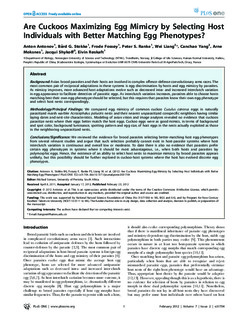Are cuckoos maximizing egg mimicry by selecting host individuals with better matching egg phenotypes?
Antonov, Anton Tinchov; Stokke, Bård Gunnar; Fossøy, Frode; Ranke, Peter Sjolte; Liang, Wei; Yang, Canchao; Moksnes, Arne; Shykoff, Jacqui A.; Røskaft, Eivin
Journal article, Peer reviewed
Permanent lenke
http://hdl.handle.net/11250/2365401Utgivelsesdato
2012Metadata
Vis full innførselSamlinger
- Institutt for biologi [2575]
- Publikasjoner fra CRIStin - NTNU [38127]
Sammendrag
Background: Avian brood parasites and their hosts are involved in complex offence-defense coevolutionary arms races. The
most common pair of reciprocal adaptations in these systems is egg discrimination by hosts and egg mimicry by parasites.
As mimicry improves, more advanced host adaptations evolve such as decreased intra- and increased interclutch variation
in egg appearance to facilitate detection of parasitic eggs. As interclutch variation increases, parasites able to choose hosts
matching best their own egg phenotype should be selected, but this requires that parasites know their own egg phenotype
and select host nests correspondingly.
Methodology/Principal Findings: We compared egg mimicry of common cuckoo Cuculus canorus eggs in naturally
parasitized marsh warbler Acrocephalus palustris nests and their nearest unparasitized conspecific neighbors having similar
laying dates and nest-site characteristics. Modeling of avian vision and image analyses revealed no evidence that cuckoos
parasitize nests where their eggs better match the host eggs. Cuckoo eggs were as good mimics, in terms of background
and spot color, background luminance, spotting pattern and egg size, of host eggs in the nests actually exploited as those
in the neighboring unparasitized nests.
Conclusions/Significance: We reviewed the evidence for brood parasites selecting better-matching host egg phenotypes
from several relevant studies and argue that such selection probably cannot exist in host-parasite systems where host
interclutch variation is continuous and overall low or moderate. To date there is also no evidence that parasites prefer
certain egg phenotypes in systems where it should be most advantageous, i.e., when both hosts and parasites lay
polymorphic eggs. Hence, the existence of an ability to select host nests to maximize mimicry by brood parasites appears
unlikely, but this possibility should be further explored in cuckoo-host systems where the host has evolved discrete egg
phenotypes.
